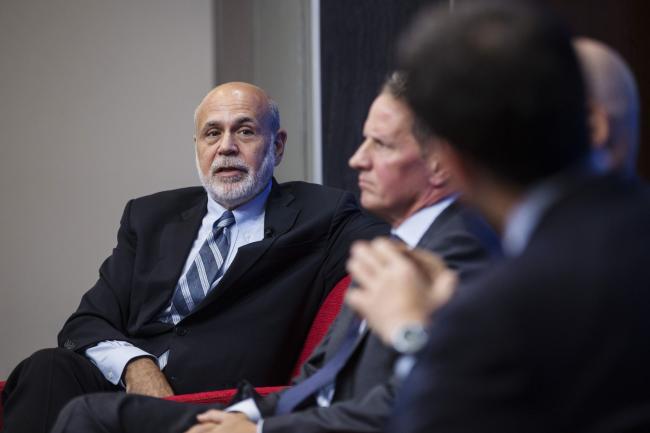
© Bloomberg. Ben S. Bernanke, former chairman of the U.S. Federal Reserve, speaks during a Brookings Institution discussion in Washington, D.C., U.S., on Wednesday, Sept. 12, 2018. The event is part of an initiative to document how and why the U.S. government’s responses to the financial crisis of 2007-2009 were designed the way they were.
NG
+0.20%
Add to/Remove from Watchlist
Add to Watchlist
Add Position
Position added successfully to:
Please name your holdings portfolio
Type:
BUY
SELL
Date:
Amount:
Price
Point Value:
Leverage:
1:1
1:10
1:25
1:50
1:100
1:200
1:400
1:500
1:1000
Commission:
Create New Watchlist
Create
Create a new holdings portfolio
Add
Create
+ Add another position
Close
(Bloomberg) — Former Federal Reserve Chair Ben Bernanke, who won the Nobel Prize in Economics on Monday for his research on financial crises, urged policy makers to watch for any worsening of financial conditions around the world as pressures from war and currency fluctuations squeeze economies.
“Even if financial problems don’t begin an episode, over time, if the episode makes financial conditions worse, they can add to the problem and intensify it, so that’s something I think that we really have to pay close attention to,” Bernanke said Monday during a press briefing at the Brookings Institution in Washington, where he’s a senior fellow.
While the US financial system is in better shape than it was ahead of the global crisis in the late 2000s, he discussed concerns elsewhere. In Europe, for example, financial institutions could be pressured by shutdowns of natural gas flows due to Russia’s invasion of Ukraine, while emerging markets “are facing a very strong dollar and a lot of capital outflows,” he said.
Earlier Monday, the Royal Swedish Academy of Sciences announced the Nobel award to Bernanke, Douglas Diamond of the University of Chicago and Washington University’s Philip Dybvig for their research into banking and financial crises.
Diamond, in a separate press briefing on Monday, said central bankers should proceed carefully as they raise interest rates to prevent fear and “self-fulfilling prophecy” from creating financial instability.
A self-described “Great Depression buff,” Bernanke was cited by the academy for his work on that era. In a 1983 paper, he showed that the downturn became so deep and so protracted in large part because bank failures severely contracted credit, doing significant damage to the economy.
He later put that research to work when he was a Fed chair and the economy was hit by a financial crisis in 2008 and 2009 arising out of a housing bubble that went bust. While he was initially slow to recognize the potential ramifications of falling home prices for the financial system, Bernanke worked feverishly afterward in combating the crisis and preventing it from turning another depression.
Today, while there may be some financial-stability risks in the US, “We’re certainly not in anything like the dire straits we were in 14 years ago,” Bernanke said Monday.
©2022 Bloomberg L.P.
Source: Investing.com




























